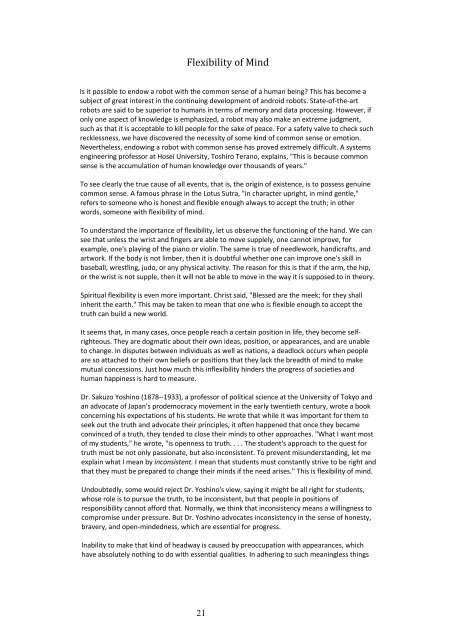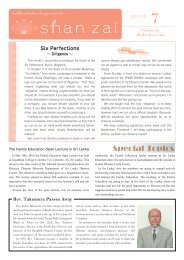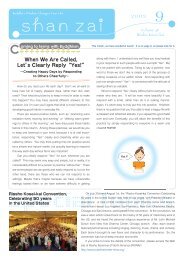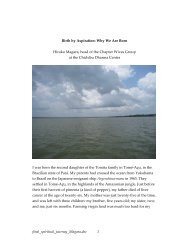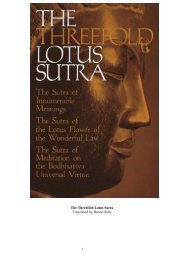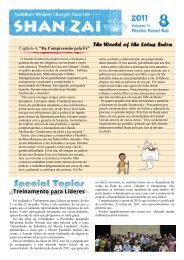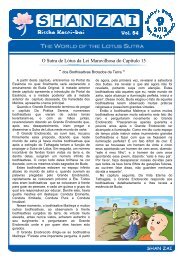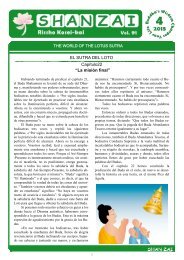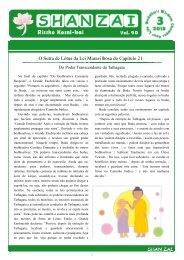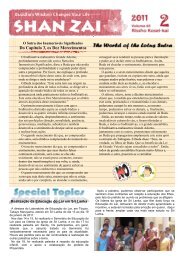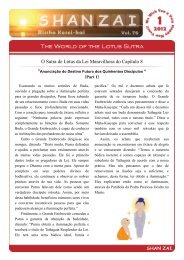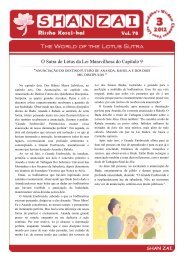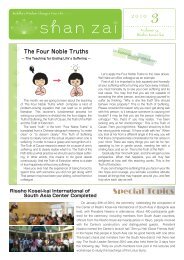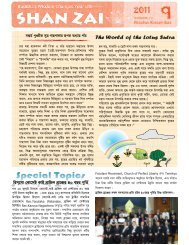<strong>the</strong> mountains, Po Chu‐i went <strong>to</strong> meet him. He inquired of <strong>the</strong> Zen master, "What is <strong>the</strong> essenceof <strong>the</strong> teachings of <strong>the</strong> Buddha?" Niao‐k'e replied, "Do no evil, do all that is good, purify yourmind. This is <strong>the</strong> teaching of all <strong>the</strong> buddhas." Po Chu‐i laughed and said, "Even a child of threecan comprehend such a teaching." Niao‐k'e replied, "This can be unders<strong>to</strong>od even by a child ofthree, but it is difficult even for an old man of eighty <strong>to</strong> practice." Po Chu‐i was left speechlessand on <strong>the</strong> spot became a disciple of <strong>the</strong> Zen master.This s<strong>to</strong>ry shows that although one may understand something with one's mind, it is difficult <strong>to</strong>act on that knowledge. "Be strict with oneself and <strong>to</strong>lerant with o<strong>the</strong>rs." "Be calm in adversity;be indifferent in prosperity." "Do what is good for <strong>the</strong> company." Even though we mayunderstand <strong>the</strong>se exhortations intellectually, <strong>the</strong>re are many things that are not so easyactually <strong>to</strong> carry out.Sun Yat‐sen, however, claimed that this is not true. He said that doing is much simpler thanknowing. Perhaps it is true that once one really understands what one should do, putting it in<strong>to</strong>practice is simple. Moreover, if one doesn't practice, <strong>the</strong>n one really does not understand. Iconstantly feel that this is <strong>the</strong> case.Accordingly, I always hope that many people will be guided in what <strong>the</strong>y do by <strong>the</strong> valuableteachings of <strong>the</strong> Lotus Sutra, one of Mahayana Buddhism's most important scriptures. Once<strong>the</strong>y fully understand its teachings, <strong>the</strong>y cannot help changing for <strong>the</strong> better and naturallyfollowing <strong>the</strong> right path.The Lotus Sutra teaches that all people may become buddhas. It is because <strong>the</strong>y do notperceive this that <strong>the</strong>y suffer, are <strong>to</strong>rmented, become cove<strong>to</strong>us, quarrel, and head down <strong>the</strong>wrong road. One of <strong>the</strong> seven parables in <strong>the</strong> Lotus Sutra is that of <strong>the</strong> gem hidden in <strong>the</strong> robe.A poor man visited <strong>the</strong> home of a good friend. The friend entertained <strong>the</strong> poor man cordiallywith food and drink, and as a result <strong>the</strong> man got quite drunk and fell asleep. Just <strong>the</strong>n, <strong>the</strong>friend was called away on some business. Hating <strong>to</strong> awaken <strong>the</strong> sleeping man, <strong>the</strong> friendquickly sewed a priceless jewel in<strong>to</strong> <strong>the</strong> lining of his friend's clo<strong>the</strong>s and left. When <strong>the</strong> poorman awoke and found that his friend had gone out, he decided that <strong>the</strong>re was nothing else <strong>to</strong>do but leave <strong>the</strong> house, <strong>to</strong>o. He resumed his wretched life of wandering and his struggle forfood and clothing, relieved <strong>to</strong> obtain whatever income he could. A long time passed, and oneday <strong>the</strong> man met his old friend along <strong>the</strong> road. The friend looked at <strong>the</strong> man's wretchedcondition and said, "Such foolishness! On <strong>the</strong> day we last met I sewed a precious gem in<strong>to</strong> <strong>the</strong>lining of your clo<strong>the</strong>s so that you would be able <strong>to</strong> enjoy a comfortable life. But look at younow!" For <strong>the</strong> very first time <strong>the</strong> man became aware that he possessed a valuable jewel.We, <strong>to</strong>o, possess a jewel that we do not take notice of‐‐<strong>the</strong> priceless jewel of <strong>the</strong> buddhanature.If we could only become aware of this, our hearts would change in an instant.Anyone who really want <strong>to</strong> improve <strong>the</strong>ir attitude can do so in a moment.20
Flexibility of MindIs it possible <strong>to</strong> endow a robot with <strong>the</strong> common sense of a human being? This has become asubject of great interest in <strong>the</strong> continuing development of android robots. State‐of‐<strong>the</strong>‐artrobots are said <strong>to</strong> be superior <strong>to</strong> humans in terms of memory and data processing. However, ifonly one aspect of knowledge is emphasized, a robot may also make an extreme judgment,such as that it is acceptable <strong>to</strong> kill people for <strong>the</strong> sake of peace. For a safety valve <strong>to</strong> check suchrecklessness, we have discovered <strong>the</strong> necessity of some kind of common sense or emotion.Never<strong>the</strong>less, endowing a robot with common sense has proved extremely difficult. A systemsengineering professor at Hosei University, Toshiro Terano, explains, "This is because commonsense is <strong>the</strong> accumulation of human knowledge over thousands of years."To see clearly <strong>the</strong> true cause of all events, that is, <strong>the</strong> origin of existence, is <strong>to</strong> possess genuinecommon sense. A famous phrase in <strong>the</strong> Lotus Sutra, "in character upright, in mind gentle,"refers <strong>to</strong> someone who is honest and flexible enough always <strong>to</strong> accept <strong>the</strong> truth; in o<strong>the</strong>rwords, someone with flexibility of mind.To understand <strong>the</strong> importance of flexibility, let us observe <strong>the</strong> functioning of <strong>the</strong> hand. We cansee that unless <strong>the</strong> wrist and fingers are able <strong>to</strong> move supplely, one cannot improve, forexample, one's playing of <strong>the</strong> piano or violin. The same is true of needlework, handicrafts, andartwork. If <strong>the</strong> body is not limber, <strong>the</strong>n it is doubtful whe<strong>the</strong>r one can improve one's skill inbaseball, wrestling, judo, or any physical activity. The reason for this is that if <strong>the</strong> arm, <strong>the</strong> hip,or <strong>the</strong> wrist is not supple, <strong>the</strong>n it will not be able <strong>to</strong> move in <strong>the</strong> way it is supposed <strong>to</strong> in <strong>the</strong>ory.Spiritual flexibility is even more important. Christ said, "Blessed are <strong>the</strong> meek; for <strong>the</strong>y shallinherit <strong>the</strong> earth." This may be taken <strong>to</strong> mean that one who is flexible enough <strong>to</strong> accept <strong>the</strong>truth can build a new world.It seems that, in many cases, once people reach a certain position in life, <strong>the</strong>y become selfrighteous.They are dogmatic about <strong>the</strong>ir own ideas, position, or appearances, and are unable<strong>to</strong> change. In disputes between individuals as well as nations, a deadlock occurs when peopleare so attached <strong>to</strong> <strong>the</strong>ir own beliefs or positions that <strong>the</strong>y lack <strong>the</strong> breadth of mind <strong>to</strong> makemutual concessions. Just how much this inflexibility hinders <strong>the</strong> progress of societies andhuman happiness is hard <strong>to</strong> measure.Dr. Sakuzo Yoshino (1878‐‐1933), a professor of political science at <strong>the</strong> University of Tokyo andan advocate of Japan's prodemocracy movement in <strong>the</strong> early twentieth century, wrote a bookconcerning his expectations of his students. He wrote that while it was important for <strong>the</strong>m <strong>to</strong>seek out <strong>the</strong> truth and advocate <strong>the</strong>ir principles, it often happened that once <strong>the</strong>y becameconvinced of a truth, <strong>the</strong>y tended <strong>to</strong> close <strong>the</strong>ir minds <strong>to</strong> o<strong>the</strong>r approaches. "What I want mos<strong>to</strong>f my students," he wrote, "is openness <strong>to</strong> truth. . . . The student's approach <strong>to</strong> <strong>the</strong> quest fortruth must be not only passionate, but also inconsistent. To prevent misunderstanding, let meexplain what I mean by inconsistent. I mean that students must constantly strive <strong>to</strong> be right andthat <strong>the</strong>y must be prepared <strong>to</strong> change <strong>the</strong>ir minds if <strong>the</strong> need arises." This is flexibility of mind.Undoubtedly, some would reject Dr. Yoshino's view, saying it might be all right for students,whose role is <strong>to</strong> pursue <strong>the</strong> truth, <strong>to</strong> be inconsistent, but that people in positions ofresponsibility cannot afford that. Normally, we think that inconsistency means a willingness <strong>to</strong>compromise under pressure. But Dr. Yoshino advocates inconsistency in <strong>the</strong> sense of honesty,bravery, and open‐mindedness, which are essential for progress.Inability <strong>to</strong> make that kind of headway is caused by preoccupation with appearances, whichhave absolutely nothing <strong>to</strong> do with essential qualities. In adhering <strong>to</strong> such meaningless things21
- Page 1 and 2: Invisible EyelashesSeeing What is C
- Page 3 and 4: THE TWO FUNCTIONS OF A CELL 55The P
- Page 5 and 6: For this to take place, it is vital
- Page 7 and 8: Pleasure is filling the empty rice
- Page 9 and 10: Rose or Thorns?The rose is beautifu
- Page 11 and 12: The Contents of Hotei's SackThe mor
- Page 13 and 14: GratitudeFor the past two decades I
- Page 15 and 16: Looking Into the DepthsEach of us m
- Page 17 and 18: Self‐AwarenessSometimes we allow
- Page 22 and 23: and hesitating to take a first step
- Page 24 and 25: "Nothing has an ego" means that all
- Page 26 and 27: self‐love, endeavoring to develop
- Page 28 and 29: ampant, Dr. Schweitzer devoted his
- Page 30 and 31: Everyone has some ability that is b
- Page 32 and 33: een pondering Kepler's theories of
- Page 34 and 35: improved, I would return home only
- Page 36 and 37: work.In another section, "The Daily
- Page 38 and 39: Hakone, I finished in fifty‐five
- Page 40 and 41: Many people want to work in their o
- Page 42 and 43: eplied, "One hundred divided by two
- Page 44 and 45: at the gate, the Buddha appeared an
- Page 46 and 47: once again sinks into despair, it t
- Page 48 and 49: individuality grows beyond the boun
- Page 50 and 51: this truth, one becomes keenly awar
- Page 52 and 53: suddenly turned irritable and said,
- Page 54 and 55: well in a sport, one obeys the rule
- Page 56 and 57: There is, however, one infallible r
- Page 58 and 59: The offering of kind words means sp
- Page 60 and 61: We must never think of ourselves an
- Page 62 and 63: The Wind Blowing from the FutureThe
- Page 64 and 65: Courage That Opens DoorsI have many
- Page 66 and 67: "Even Insects Work and Eat"My paren
- Page 68 and 69: Home Is More Than a HavenIn recent
- Page 70 and 71:
Where Affection and Gratitude Begin
- Page 72 and 73:
Forever Young at HeartAlmost every


